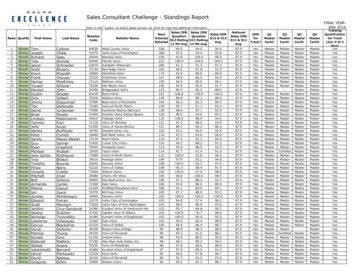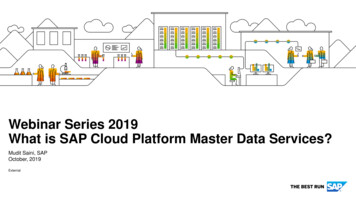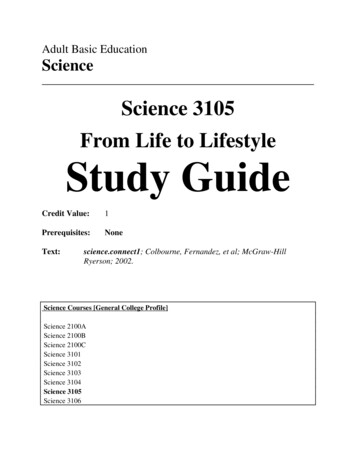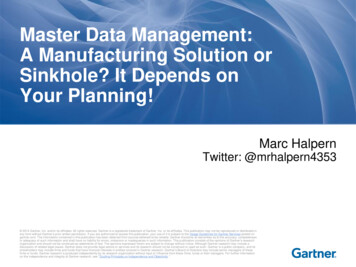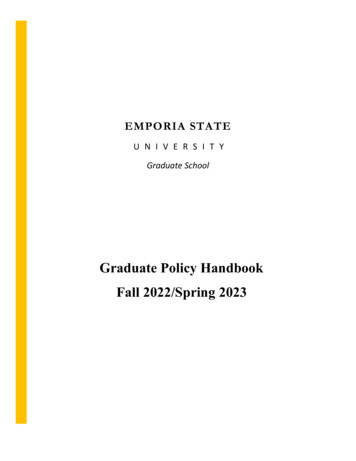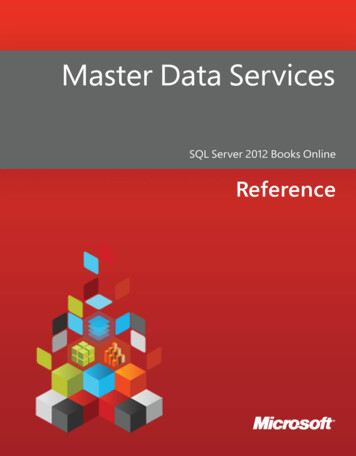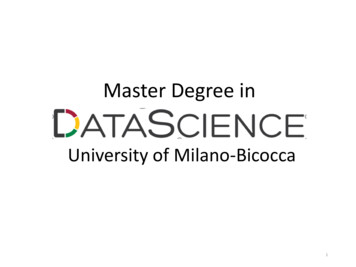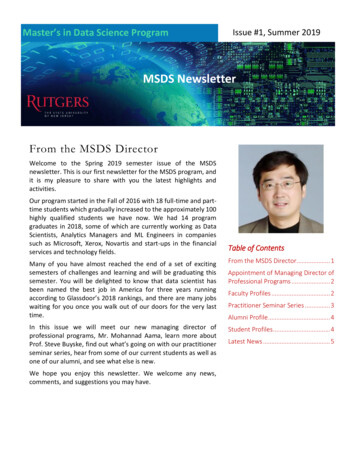
Transcription
Master’s in Data Science ProgramIssue #1, Summer 2019Master’s in Data Science ProgramIssue #1, Spring 2019Master’s in Data Science ProgramMSDS NewsletterIssue #1, Spring 2019Master’s in Data Science ProgramIssue #1, Spring 2019Master’s in Data Science ProgramIssue #1, Spring 2019From the MSDS DirectorIssue #1, Spring 2019Master’s in Data Science ProgramWelcome to the Spring 2019 semester issue of the MSDSnewsletter. This is our first newsletter for the MSDS program, andMaster’sin DataScienceit is mypleasureto Programshare with you the latest highlights and Issue #1, Spring 2019activities.Our programthe Fall of 2016 with 18 full-time and part- Issue #1, Spring 2019Master’sin DatastartedScienceinProgramtime students which gradually increased to the approximately 100highly qualified students we have now. We had 14 programgraduatesin 2018,someof which are currently working as Data Issue #1, Spring 2019Master’sin DataScienceProgramScientists, Analytics Managers and ML Engineers in companiessuch as Microsoft, Xerox, Novartis and start-ups in the financialTableContentsIssue#1, ofSpring2019Master’sDatatechnologyScience Programservicesinandfields.From the MSDS Director . 1Many of you have almost reached the end of a set of excitingsemestersof challengesand learning and will be graduating thisMaster’sin DataScience Programsemester. You will be delighted to know that data scientist hasbeen named the best job in America for three years runningaccordingto Glassdoor’s2018 rankings, and there are many jobsMaster’sin DataScience Programwaiting for you once you walk out of our doors for the very lasttime.Master’s in Data Science ProgramIn this issue we will meet our new managing director ofprofessional programs, Mr. Mohannad Aama, learn more aboutProf. SteveBuyske,findProgramout what’s going on with our practitionerMaster’sin DataScienceseminar series, hear from some of our current students as well asone of our alumni, and see what else is new.Master’sin DataWe hopeyouScienceenjoy Programthis newsletter. We welcome any news,AppointmentManaging Director ofIssue#1, Spring of2019Professional Programs . 2Faculty Profiles . 2Issue #1, Spring 2019Practitioner Seminar Series . 3Alumni Profile . 4Issue #1, Spring 2019Student Profiles . 4Latest News . 5Issue #1, Spring 2019Issue #1, Spring 2019comments, and suggestions you may have.Master’s in Data Science ProgramIssue #1, Spring 2019Master’s in Data Science ProgramIssue #1, Spring 2019Master’s in Data Science ProgramIssue #1, Spring 2019
MSDS Newsletter, Issue #1, Spring 2019Page 2Appointment of Managing Director of Professional ProgramsWe are pleased to announce that Mr. Mohannad Aama will be serving as the ManagingDirector of the newly established Office of Professional Programs of the Rutgers StatisticsDepartment. The Office of Professional Programs will provide comprehensive andunified services to students in both FSRM and MSDS programs, combining the serviceswe currently offer separately to FSRM and MSDS. Its functions include careerdevelopment services, industry relationship, and outreach activities. The primary goal isto provide the necessary resources and training to help you achieve your professionalgoals. This goes beyond our efforts to: 1) increase the number and scope of industryrelationships and corporate partners to bring about more job and internshipopportunities for you, and 2) provide you with the needed professional assistance tosuccessfully land and navigate job interviews.Prior to joining Rutgers, Mr. Aama worked in the financial services industry for the past 15 years in variouscapacities including equity research, portfolio management and risk management. He holds an MBA degree witha concentration in Finance and Accounting from the Simon School of Business at the University of Rochester.He also holds FRM and CFP certifications. His broad expertise and experiences will greatly enrich our programsand the department as a whole.Faculty ProfilesProfessor Steve Buyske never graduated high school. Yet he holds not one, but TWOPhD degrees! After graduating Deep Springs College and Haverford college with aBA in Mathematics, he obtained his PhD in mathematics from Brown University in1988, after which he taught at Lavayette College in Easton Pennsylvania. Here hefirst experienced statistics when asked to teach an Intro to Statistics course.Statistics appealed to him so much that he went back to school and obtained hissecond PhD, this time in statistics, from Rutgers University in 1998. Rutgers hiredhim immediately after and he has been with us ever since.Professor Buyske was on the MSDS committee from the start and originated the“Data Wrangling and Husbandry” course. He was also our acting director last year while Prof. Chen was onsabbatical.What he likes best about the Data Science program is that our students come from lots of different backgrounds,be it mathematics, statistics, computer science, or one of a multitude of other fields, and many have been inthe workforce for a while. All this diversity makes it certainly more challenging to teach, but also makes it somuch more interesting!
MSDS Newsletter, Issue #1, Spring 2019Page 3Ruobin Gong is assistant professor of statistics at Rutgers University. Her researchinterests lie at the foundations of uncertainty reasoning, theory and methods ofstatistical inference with random sets, imprecise probability, Dempster-Shafer theoryof belief function, as well as the computation and applications of Bayesian andgeneralized Bayesian modeling to robustness and privacy statistics.Ruobin obtained her Ph.D. in statistics from Harvard University, and B.Sc. in cognitivepsychology from the University of Toronto. She is a Harvard Horizons Scholar, and gavea talk at the eponymous Symposium titled the Virtue of the Unsure'' in 2017. Ruobinwas a research fellow for Data Science for Social Good at the University of Chicago in2015. Currently, Ruobin teaches MSDS 596: Regression and Time Series Analysis for Data Science, as part of thecore methodology courses in the Master of Data Science program.Practitioner Seminar SeriesJerome Gilbert - “AI Everywhere – Putting Smart to Work” On Friday February 22, 2019 the MSDS programhosted Jerome Gilbert, North America Technical Leader for System z Analytics at IBM. Titled “AI Everywhere –Putting Smart to Work”, Jerome’s presentation touched on how Data is now the basis of competitiveadvantage for many firms and how the growth of AI is expected to proliferate both in consumer andenterprise use and spending. The standing room only crowd listened to Jerome as he covered the 5 MachineLearning Personas (Steward, Engineer, Scientist, Developer and Analyst) and the importance of being good“Data Stewards” as the type and quantity of data collected increases and touches so many aspects of our lives.Peter Cotton – “Building a Prediction Web” Peter Cotton, PhD, Executive Director in J.P. Morgan’s DataScience Group gave a seminar on March 29 that covered his firm’s efforts to build a “Prediction Web”. RoarData is an experiment in Collective Intelligence undertaken by J.P. Morgan, academic and industry partners.The premise is that streaming data, machine learning, micro services and cryptography support powerful newways of organizing predictive analytics. The engineering ambition is a Prediction Web open to all - furtheringthe democratization of data science started by MOOCs and open source software. Peter discussed how DataScience is the “Search” -think google- for models and data and how contests and “Networks” will change thisSearch dramatically. He elaborated how talent is distributed evenly around the world and how opportunity isnot. He described how a Prediction Web can be the shared feature space that can help solve this issue and be,among other things, the source of “hyper-specialization” in real time.In addition to the two Data Science seminars above, MSDS students were invited to seminars hosted by theFinancial Statistics and Risk Management program (FSRM) that dealt with financial statistics and analytics,machine learning, and algorithms.Satish Ramakrishna – “The normal distribution is Abnormal” The FSRM program hosted Satish Ramakrishna,PhD the Chief Risk Officer at Two Sigma Investments, LP on April 12 who gave a stimulating seminar on nonnormality in the "real" world of finance.Kelly Ye - “The Art and Science of Hedge Fund Replication” Kelly Ye, CFA, Director of Research at IndexIQ, theETF platform for New York Life Investments gave an overview of the hedge fund replication problem, itshistory, validity and the science behind hedge fund replication algorithms.
MSDS Newsletter, Issue #1, Spring 2019Page 4Alumni ProfileXing Xiong is currently working for WePay as a data scientist focusing on fraud detection,where he builds machine learning models processing large numbers of daily payments.He obtained his bachelor’s degree in Statistics from Tongji University in 2016, after whichhe joined Rutgers University to pursue a master’s degree in data science. During his timethere he realized he had a strong interest in data science. He had an internship withConcord Advice where he gained a lot of experience in how to apply data sciencetechniques to do fraud detection and risk management.“The data science program not only taught me the necessary theoretical knowledge, butalso how to combine theory with practice. I liked the arrangement of the various courses,covering basic statistics knowledge, machine learning techniques, and Python coding. Itguided me in my growth from college student to real-world data scientist. The faculty in the program really careabout their students and are very supportive. I really enjoyed my two years as a student in the Rutgers MSDSprogram.”Student ProfilesWanting Tan is a second year MSDS student who holds a bachelor’s degree instatistics from China, which she says was very theoretical. She wanted to learn howto apply her knowledge and obtain practical skills to be able to get into the datascience field. She chose to attend Rutgers because of the collaboration between thecomputer science department and the statistics department. Once here, she learnedmany practical skills like SQL, Python, and statistical learning; she found the classesvery interesting, and especially liked the fact that she was able to take classes fromboth departments. She feels she has been presented with many real-world datascience challenges.Wanting is a full-time student who will be graduating this semester.Wanting has had two internships; she was at WeWork in NYC from June 2018 to August 2018, as a data scienceintern on the revenue optimization team where she helped with data cleaning and data management. She alsofinished an individual business project and helped colleagues with their projects. She worked with SQL, R,Python, and Tableau, and noted that at this internship the focus was on inference. During her interview sheasked why they had picked her for the job, and she was told that they selected her for her interpretation abilities;the translation of a statistical model into the business inside is vital to the work of a data scientist, and she wasable to properly translate the meaning of the results of the statistical models.Her second internship is at IFS Securities. She started there in February 2019 as a part-time data science internand is expected to stay until May 2019. The company is a financial services company dealing with data relatedto bonds and focuses on prediction. Wanting is responsible for a project that predicts the total interest rate forthose bonds. She notes that the data at this company is more complicated and there is more time needed totrain the model. She enjoys the fact that she gets the opportunity here to work with people from all over theworld.Wanting is very pleased with the MDSD program and is particularly pleased with Mr. Libretti and Mr. Aama,whom she says helped her a lot with opportunities for internships and her full-time job search.
MSDS Newsletter, Issue #1, Spring 2019Page 5Shubhada Suresh studied electronics at the University of Mumbai, India. After receiving herundergraduate degree, she worked for 3 ½ years as a database developer in global investmentbanks, which made her eager to find more insight into the data she was handling. This made herapply to our MSDS program, from which she expects to graduate in May this year. Shubhadaparticularly liked the structure of our program as it provided a deep understanding of requiredtopics like probability, statistical methods, data mining, and machine learning, which areessential in order to have a successful career as a data scientist. She chose the statistics trackbecause she believes that statistics is vitally important as it gives a broader perspective to notonly implement the models but also understand how they are connected and are related.Shubhada held an internship in the summer of 2018 as a data science intern at Morgan Stanley that was extendedinto the fall. At Morgan Stanley she worked with R, Python, PostgreSQL, Sparkle, and UNIX. She was responsible to pinpoint performance issues in data mart ETL using statistical analysis and machine learning techniques. She also helpedthem building and designing machine learning models in the fields of quantitative, marketing, and fixed income,and finally helped in developing an ontology/knowledge graph of financial markets to support natural-languageprocessing.Morgan Stanley has offered her a full-time position starting this August.Latest News-Our MSDS program was recently featured in Amstat Magazine’s April Issue. Check it out-Please join the MSDS alumni private group on LinkedIn here https://www.linkedin.com/groups/4240269/-Follow the MSDS program’s social media feeds:Twitter https://twitter.com/Rutgers MSDSLinkedIn in-data-science/Editor: Ellie SmallMSDS programDepartment of Statistics and BiostatisticsRutgers UniversityHill Center, Busch Campus110 Frelinghuysen RoadPiscataway, NJ 08854Email: msds@stat.rutgers.edu
Master's in Data Science Program Master's in Data Science Program . North America Technical Leader for System z Analytics at IBM. Titled "AI Everywhere - . techniques to do fraud detection and risk management. "The data science program not only taught me the necessary theoretical knowledge, .

